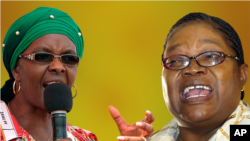Besides the alleged coup d’état by his deputy, Zimbabwean President Mugabe is facing a more stubborn threat that he cannot eliminate by political retribution - the crumbling national economy.
Mr. Mugabe - the only president the country has ever known since independence in 1980 - seems to believe the as yet unsubstantiated allegations that Vice President Joyce Mujuru was plotting to topple him.
His wife, Grace, a highly divisive political rookie who officially assumes the Zanu-PF Women’s League headship this week, has led a myriad of charges against Mrs. Mujuru, including a coup plot and corruption.
With an unchecked tongue, she has savaged the vice president and her allies with uneasy invectives and barbed rhetoric that President Mugabe himself has arguably never used.
That’s not to say the president has completely outsourced his political defenses or offences against Mrs. Mujuru to his wife.
On Tuesday he accused the vice president of being too simplistic and big-headed to lead Zimbabwe after she boycotted a meeting of the Zanu-PF Politburo for the second week running.
Despite the party’s ambitious election promises last year, critics say the Zanu-PF government has struggled to get it right on the troubled economy.
Officials have expended more time on factional party politics than on the economy, the critics say.
And with the succession question expected to be resolved at the ongoing Zanu-PF congress this week, Studio 7 asks: Can Mugabe and his governing party finally focus on the economy?
Not so promising, says economic commentator Masimba Kuchera.





